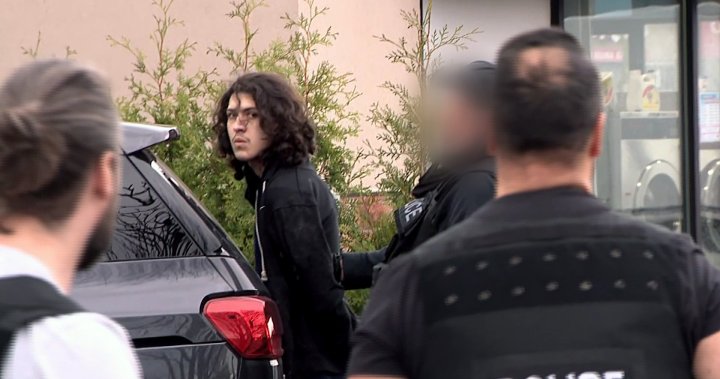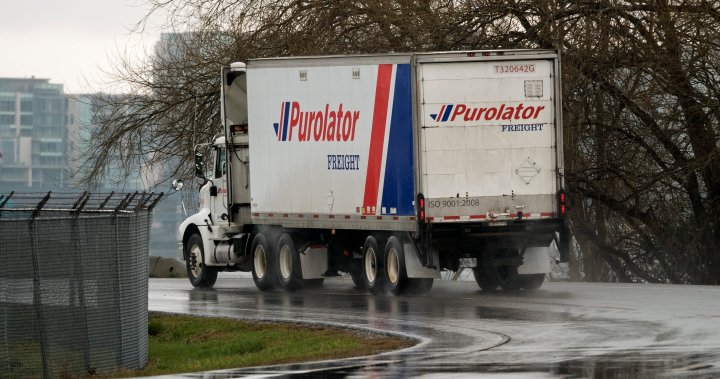Outside a retirement complex in east Toronto, where all but shift workers are asleep in the early hours, a dramatic police takedown is about to unfold.
In less than five hours, a police officer will be in hospital, a suspected car thief in handcuffs and a second suspect – a wanted fugitive.
This is the frontline in the war against auto theft in Canada — where a car is stolen roughly every five minutes.
To understand how police are fighting the scourge, Global News is riding along with the York Regional Police auto theft unit.
Det. Scott Cresswell leads the York Regional Police auto theft unit for a takedown.
Trevor Owens / Global News
On this late April morning, Det. Scott Cresswell is leading a team of six officers, supported by two canine units. The operation is part of a larger investigation, called Project Boa, targeting a crime group that has been stealing cars overnight across the Greater Toronto Area and as far west as Kitchener.
Those stolen vehicles are loaded into shipping containers, sent to the Port of Montreal, and transported overseas. Each will fetch tens of thousands of dollars.
Cresswell says this morning’s target is a stolen grey Lexus RX SUV, what he calls a crime car — a vehicle a thief uses to commit more crimes and steal other vehicles. His team has been following this Lexus for 10 days, watching as suspected thieves use it to steal two to four cars a night.
It’s this vehicle, they hope, that will lead them to the criminals.
The Lexus RX SUV that Det. Cresswell says is being used as a crime car.
Trevor Owens / Global News
According to Cresswell, at the end of an overnight crime spree, the thieves have been parking the Lexus outside a retirement home in Thorncliffe Park, tucked out of the way, in an area rarely patrolled by police.
Cresswell nods to the suspected thieves’ strategy as he drives past the lot: “A great spot.”
In anticipation of the suspected thieves returning in the Lexus, Cresswell’s team members strategically park their undercover vehicles in the parking lot, across and down the street. Once the suspects arrive, the police will apprehend them.
But the officers have to choose the right moment. Before they attempt an arrest, it’s important the suspected thieves are away from the vehicle, so they can’t easily flee or hit them with the SUV.
So much for planning, though.
When Det. Cresswell and his team arrive at 5 a.m., the Lexus is already there, parked in a row of vehicles outside the retirement home.
It doesn’t add up. “This crew especially, they don’t stop at 5 a.m.,” Cresswell says. “They’d steal right until seven or 7:30 a.m.”
His hunch is that the suspected thieves aren’t done yet.
The auto theft team watches from their seven undercover vehicles. The two canine units, ready for any possible pursuit, are parked at the very rear of the lot.
The surveillance team has to flip the script: they will wait for the suspected thieves to return and then they will follow them. They hunker down in their vehicles, eyes peering above the dash.
An hour later, two young men, hoodies up and wearing medical masks, walk toward the Lexus.
Two suspected car thieves walk back toward the Lexus in the retirement home complex.
Trevor Owens / Global News
“Two on foot,” Det. Cresswell calls into the police radio as he slides down from view in his unmarked, Ford F150 police truck. “These are our guys coming to the skate,” he says, using police slang for a car.
“They might heat check this area,” he says, suggesting that the suspected thieves will scan the area for police. “Keep your head down.”
The two hooded men get into the Lexus and drive slowly past Cresswell’s truck.
“For the crew, it’s a surveillance play at this point,” the detective says. He hangs back in his pick-up, parked across from the retirement home, while other members of his team trail the Lexus in their vehicles.
What happens next comes in short radio bursts from the team that is following the crime car.
Det. Scott Cresswell listens for updates on his police radio as his team follows the suspected car thieves.
Trevor Owens / Global News
They track the Lexus moving about three kilometres east, through a residential area of East York, near Pape and Gowan. The suspected thieves then stop at a covered parking lot.
“Both parties are out,” one team member radios in.
The two young men exit the Lexus and allegedly steal another vehicle: a Toyota Tacoma.
“The Tacoma door’s open. They’re on foot — working on the GPS,” the officer radios in.
“This is common. They’re going to see if they can disable the GPS,” Cresswell explains.
Soon, both vehicles are driving in tandem as the York Regional Police auto theft unit secretly pursues.
How car theft networks operate
More than 105,000 vehicles were stolen across Canada in 2022, according to the latest available data from the Insurance Bureau of Canada.
Global News spoke with police, criminal defence lawyers, and other experts who helped reveal how those thefts are carried out.
An organized crime group, often composed of older men, will use social media to recruit young people into their racket.
Theft rings will use youth under the age of 18 to make the initial steal, as young offenders face little or no jail time.
Under the cover of darkness, young men survey driveways and parking lots, looking for high-end and sought-after vehicles: Honda CRVs, Range Rovers, Toyota Highlanders, and Lexus RXs.

One of the most common ways thieves steal vehicles is through a reprogramming attack: they break into the car, plug into the onboard diagnostic port located under the dashboard, and reprogram a key fob or make a master key to start it.
Another means is a “CAN bus” or “CAN injection” attack, in which the thieves access a vehicle’s Controller Area Network, or central computer. In as little as 40 seconds, they can overwhelm the computer with messages, which it interprets as the key FOB being present, allowing them to get in and start the car.
Once stolen, thieves often leave a vehicle at a “cool-off spot” for 24 hours or days, typically in a high-density residential area to avoid police detection.
The Lexus was first spotted at a cooling spot the auto theft team was surveilling, outside an apartment building near Don Mills and Eglinton, a short drive away.
“Thieves are cognizant that vehicles now have factory-installed GPS, but many (owners) are putting in after-market tracking,” Cresswell says.
They will want to ensure no one, including police, is trying to trace their stolen vehicle, before they try to move it, Cresswell says.
It’s 7:43 a.m., and Det. Cresswell’s team radios in that the Lexus is headed back toward the retirement complex in Thorncliffe Park, where the early morning stake-out began. The light of dawn is emerging, and nearby streets are starting to hum with traffic.
Cresswell is in a surveillance position in his pick-up truck across from the entrance to the parking lot.
The Lexus is nearby but proceeds with caution.
Instead of pulling into the lot, the driver appears to do several heat checks, circling the area to ensure the police aren’t following him.
Soon, the Toyota Tacoma that was allegedly stolen only an hour earlier enters, followed by the Lexus.
“This is going to be it, guys,” one officer calls in.
“Get down! Make sure you’re down,” Det. Cresswell tells the Global News journalists.
Global News journalists lay low in a surveillance vehicle while riding along with York Regional Police.
Trevor Owens / Global News
The driver of the Tacoma parks the trucks in the back corner of the lot and rejoins the driver inside the Lexus.
But rather than park the Lexus, its driver heads to a third vehicle, a Hyundai Santa Fe, just down the street.
“This might be their getaway vehicle,” Cresswell’s partner radios in.
The passenger exits the Lexus and gets in the Santa Fe.
Then, the driver of the Lexus spins the vehicle around and heads back to the retirement home parking lot. He parks the vehicle and exits, walking casually in all-black, hoodie pulled up, mask on.
It’s the moment Cresswell and his team have been waiting for.
York Regional Police officers pursue a suspected car thief.
Trevor Owens / Global News
“He’s out! He’s out!” Det. Cresswell calls out over the radio.
“He’s away! He’s away! Go, go, go! ”
One of the police dog units, that was positioned at the back of the parking lot, starts the pursuit, along with a member of the auto theft team.
Seeing the officers, the suspect flees, running across the street and behind a nearby laundromat.
But the two officers and a German Shepherd run after the suspected thief and make the arrest.
Meanwhile, the second suspect, now in the Santa Fe, doesn’t give himself up.
Instead, he guns the engine.
The Sante Fe only metres away, Cresswell tries to manoeuvre his vehicle to pin the suspect, but two pedestrians get in the way and he slams on the brakes to avoid them.
A second officer with the canine unit appears and runs right at the Santa Fe.
Rather than stop, the suspected car thief drives straight at the police officer and hits him. The officer crashes into the windshield, is tossed head over foot in the air, and lands on his side on the pavement.
“Oh F—! K-9 just got hit,” Cresswell gasps, jumping out of his truck. The team calls for immediate medical support.
The canine unit officer is alive. He rolls over and limps to the side of the road.
Paramedics load a canine unit officer into an ambulance after he was struck a suspected car thief fleeing in a vehicle.
Trevor Owens / Global News
The blare of sirens intensifies as fire trucks and ambulances rush to the scene. Paramedics load the officer, who has a broken rib, onto a stretcher.
Other members of the team find the Santa Fe a few blocks away, abandoned, its windshield shattered from the impact.
But the driver has vanished.
After scouring the area and interviewing family members, the police issue a warrant for the suspected thief’s arrest.
But in handcuffs, sitting in the open trunk of a police minivan, is an 18-year-old suspected car thief: Ahmed Abdul Wasee of Toronto. He will be charged with 11 criminal counts, including stealing a vehicle and possessing an automobile master key.
18-year-old suspected car thief, Ahmed Abdul Wasee of Toronto, is arrested by York Regional Police.
Trevor Owens / Global News
Two weeks after the incident, the suspected driver of the Santa Fe that struck the canine unit officer, Muhammad Jogiyat, also 18, will turn himself in to the police.
He is now facing nine charges, including stealing a vehicle, dangerous driving causing bodily harm, and possessing an automobile master key.
“You need a multi-tiered approach to fight auto crime and trafficking overseas,” says Cresswell, beginning with the crime bosses and recruitment. “But you also need this street-level interdiction because it also sends a message: You can’t just go out and steal. You are going to get arrested. You are going to go to jail.”



